Climate change in Nigeria
Climate change in Nigeria
Global warming effects the Nigerian society as well as the valuable eco systems and wildlife the country has. The Nigerian climate has already had some significant changes in variable rainfall, temperature, floodings, desertification, land degradation and extreme weather.
Climate change affects Nigeria’s wildlife significantly, on nigeriawildlife.com you can read about the impact on wildlife in more detail.
Nigerian contribution to climate change
Nigeria is a significant emitter of greenhouse gases, particularly carbon dioxide (CO2), which is the primary contributor to global warming. The main sources of CO2 emissions in Nigeria are the burning of fossil fuels for electricity generation and transportation. The country also has a significant agricultural sector, which contributes to methane emissions through livestock production and rice cultivation.
According to data from the Global Carbon Project, Nigeria’s CO2 emissions have been steadily increasing since the 1990s, and in 2019. Nigeria was ranked as the 14th largest emitter of CO2 in the world. The country’s total emissions in 2019 were approximately 216 million metric tons of CO2, which is roughly 2% of global emissions.
When compared to other major countries, Nigeria’s emissions are relatively small compared to countries like China and the United States, which are the largest emitters in the world. In 2019. China’s CO2 emissions were approximately 10.2 billion metric tons, while the United States emitted approximately 5.8 billion metric tons. However, when compared to other African countries, Nigeria’s emissions are relatively high. In 2019, South Africa was the second-largest emitter in Africa, with emissions of approximately 361 million metric tons.
It is worth noting that Nigeria’s emissions per capita is relatively low, which means that emissions are spread among a large population. However, as Nigeria’s population and economy continue to grow, so will its emissions. Therefore, it is important for the country to implement policies and measures to reduce emissions and to transition to cleaner energy sources.
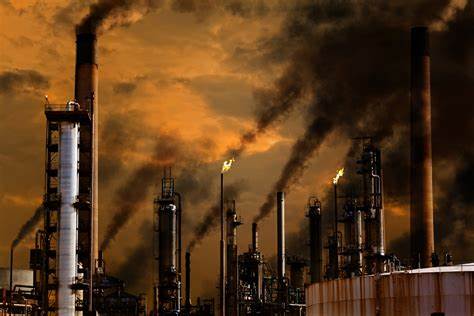
Results of climate change

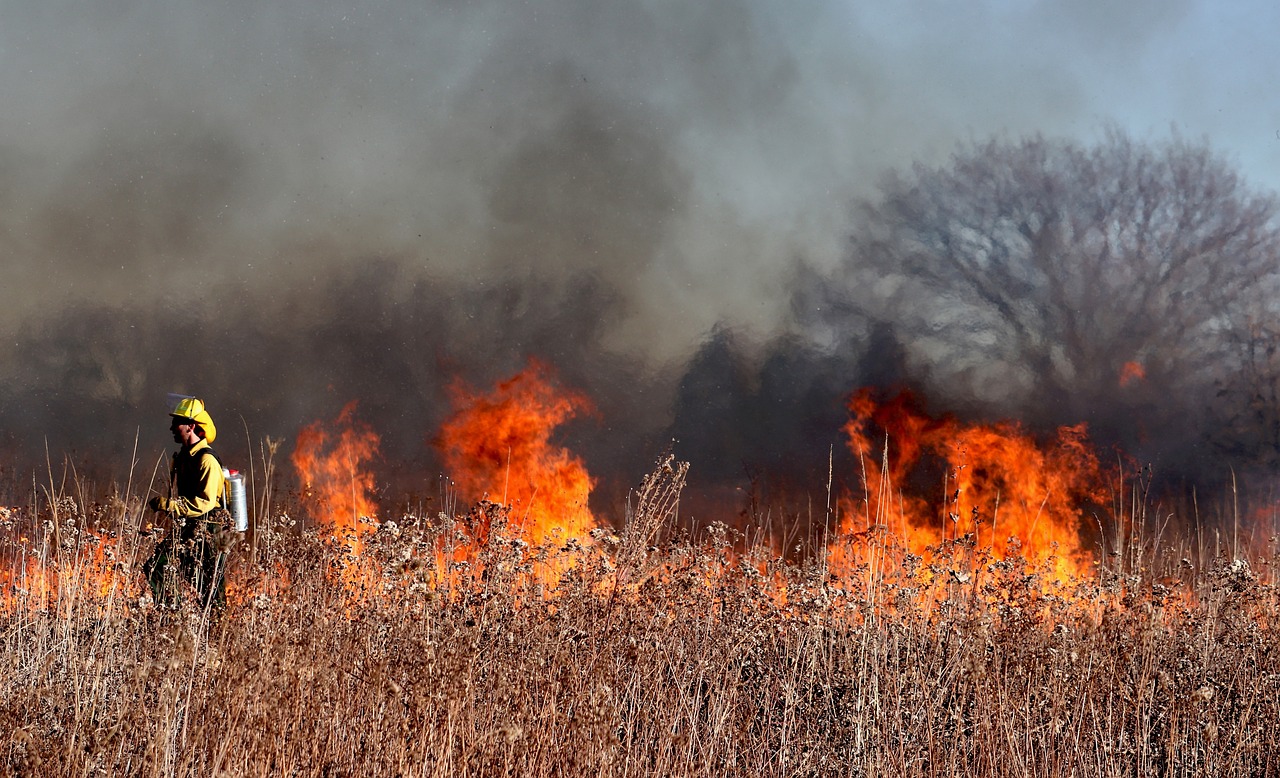
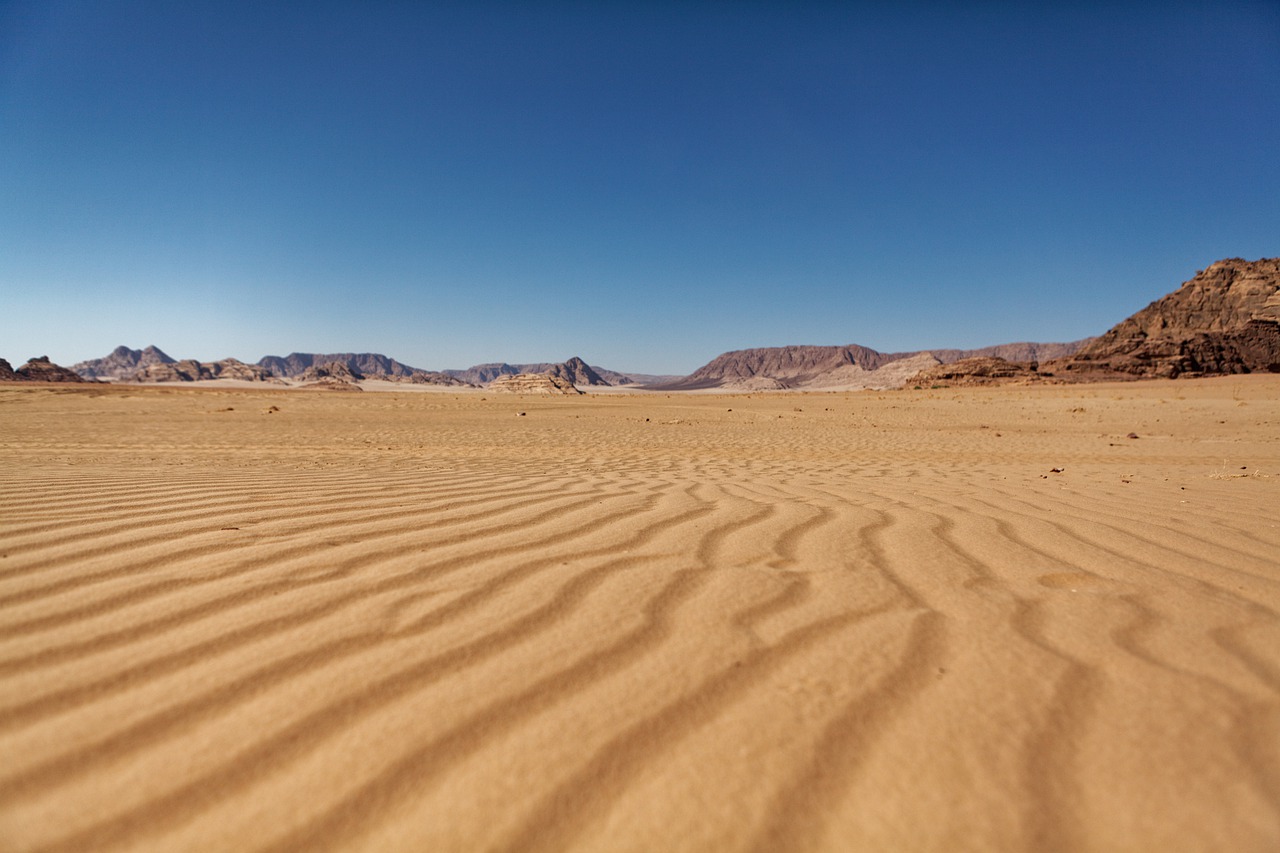
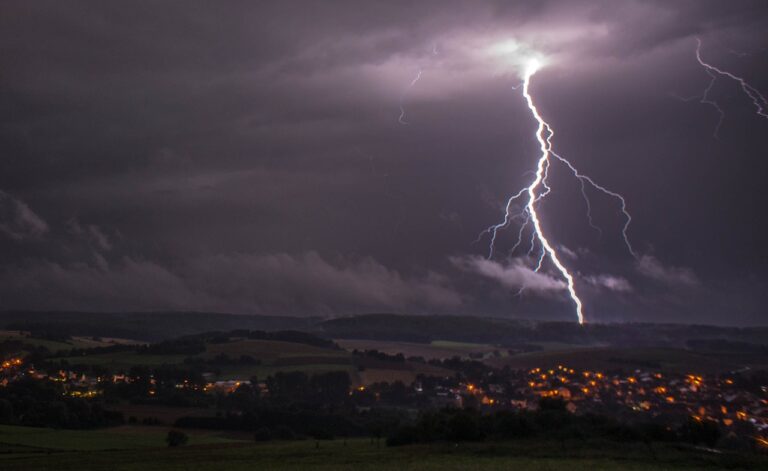
Climate change can have a range of negative impacts on Nigeria. Some potential consequences include more frequent and severe weather events, such as floods and droughts, which can damage infrastructure and lead to food and water shortages. Rising sea levels could also result in coastal flooding and erode Nigeria’s long coastline. Additionally, climate change can negatively impact agriculture and fisheries, which are important sources of income and food for many people in Nigeria. This could lead to economic disruptions and difficulties for those who depend on these industries for their livelihoods. Overall, the effects of climate change are likely to be wide-ranging and potentially devastating for Nigeria and its people.
Deforestation
Nigeria is facing a significant problem with deforestation, with one of the highest rates in the world. This has resulted in a loss of nearly 567,371 hectares of forest out of a total of 10,048,732 hectares. The main causes of this deforestation include the need for agricultural land, the burning of wood for cooking, and the exploitation of natural resources such as gas. These actions not only harm ecosystems, but also contribute to the degradation of the land and the loss of biodiversity. Additionally, the effects of climate change are also taking a toll on Nigeria’s ecosystems, further exacerbating the problem. Tackling the issue of deforestation in Nigeria requires a multifaceted approach that addresses the underlying causes and aims to reduce the negative impact on the country’s natural resources. This includes identifying the reasons behind the cutting down of trees, such as increasing demand for agricultural land or access to natural resources. Additionally, it is important to minimize the effects of climate change on Nigeria’s ecosystems, as it can exacerbate the problem of deforestation. This can be achieved by implementing conservation
measures and protecting key areas, as well as taking steps to decrease
emissions and slow the rate of climate change. By addressing the root causes of deforestaton and reducing the impact on natural resources, Nigeria can successfully protect its ecosystems for future generations.
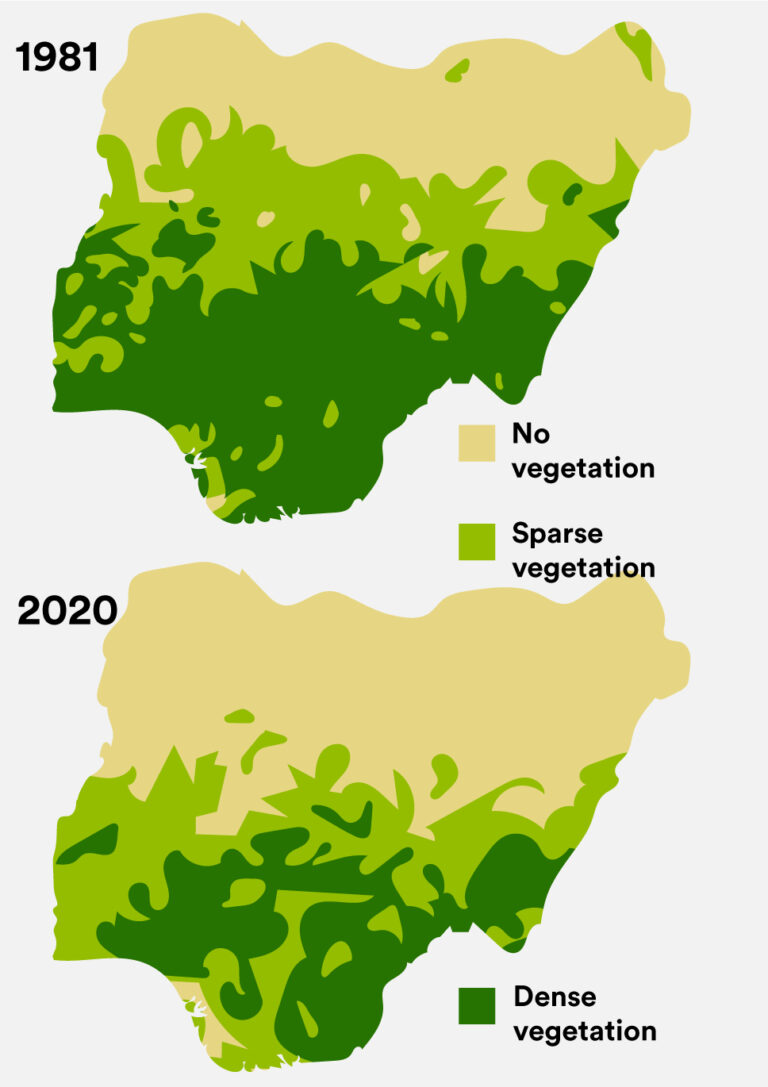
Floods
Nigeria has had some devastating floods, climate change made floods occur more often and more devastating. More rainfall in the wet season and the rise of sea level made some regions more phrone to floods. Floods are common in some parts of Nigeria mostly in the Nigerdelta and some parts of Lagos, but also in nothern Nigeria are floods such as the one that occured in 2010 in the Jigawa State. This flood affected 2 million people in the region, unfortunately are floods common in Nigeria resulting in damages in infrastructure aswell as casualties.
Between May and October in 2022 were some of the most devastating floods Nigeria had ever experienced. 1.4 Million people were displaced with over 200 000 homes being completely or partially destroyed. Unfortunately, 603 people were killed as well as over 2400 people that were injured. Additionally, over 110 000 hectares of farmland were destroyed, which caused prices of food to rise and endangered Nigeria’s food security.
Droughts
Drought is a major issue in Nigeria, and it poses a significant danger to both the people of Nigeria and the country’s economy. One of the main causes of this problem is climate change.
Climate change is causing temperatures to rise and precipitation patterns to change. This is making it more difficult for Nigeria to produce enough food and water to sustain its population. This is particularly problematic in rural areas, where many people rely on farming and herding to make a living.
The lack of water and food has a ripple effect on the Nigerian economy. Businesses struggle to survive and people are forced to leave their homes in search of work. The situation is also putting a strain on the government, as they struggle to provide aid and support to those affected by the drought.
To make matters worse, the drought is also increasing the risk of disease and conflict. As people are forced to move in search of water and food, they are more likely to come into contact with other communities, which can lead to clashes over resources.
In order to address this problem, it is essential that Nigeria takes steps to address the root cause of the drought: climate change. This means investing in renewable energy, protecting and restoring natural ecosystems, and promoting sustainable agricultural practices. Additionally, the government must also ensure that aid and support reach the people who need it most.
Overall, drought in Nigeria is a dangerous and complex problem that requires immediate attention. Climate change is a major cause of it and addressing it will require a combination of immediate aid and long-term solutions. The government must take action to address this issue and protect the people and economy of Nigeria.
Temperature increase
Nigeria’s climate has been experiencing a steady increase in temperature since the 1980s, with an average rise of 1 degree Celsius year-round. This rise in temperature not only affects the country’s society and its ecosystems, but also exacerbates the global warming crisis. For instance, the elevated temperatures lead to a rise in sea levels, posing a threat to coastal cities such as Lagos and Port Harcourt. Additionally, this has far-reaching consequences for the country’s agriculture and fishing industries. These industries are essential for the livelihoods of many Nigerians. Hence, it is important for the country to take necessary steps to reduce the effects of climate change, such as investing in renewable energy and promoting sustainable practices.

Wildfires
Wildfires in Nigeria are a growing concern that must be addressed. Activities such as farming and land clearing are causing significant damage to the environment and putting people’s lives at risk. The dry season, which typically runs from November to February, can exacerbate the problem. By making dry brush and grass more susceptible to catching fire and spreading quickly.
However, steps can be taken to prevent and manage these wildfires. For example, by educating people about the risks and how to prevent them and implementing proper land-use planning. These measures reduce the likelihood of fires so that damage to the environment can be reduced. Additionally, early warning systems and rapid response teams can help contain and control fires once they do occur.
It’s important to recognize that wildfires are a natural part of many ecosystems. We should strive to prevent human-caused fires, but it’s also important to allow some fires to burn in order to maintain healthy ecosystems.
In conclusion, wildfires in Nigeria are a serious problem that requires immediate attention. With proper education, management, and planning, we can reduce the risk of these fires and protect the environment and local communities.
Effects on public health
Climate change can have a impact on the public health in Nigeria this can be direct and indirect. Climate change increases the severity and amount of extreme weather events such as floods, droughts and heatwaves. These extreme weather events can lead to physical stress and harm a persons health, especially more vulnerable people like older people and people with an illness . These weather events can also cause food and water shortages which make people more vulnerable to diseases.